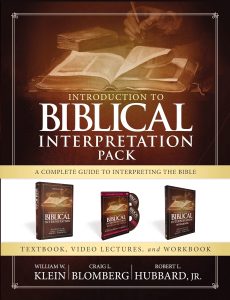Course Syllabus

Workbook
DVD: 12 Lessons
Textbook: Introduction to Biblical Interpretation
Chapter 1: The Need for Interpretation
- What is Hermeneutics?
- Challenges to Biblical Interpretation
- Time, Cultural, Geographical, Language
- The Goal of Hermeneutics
Chapter 2: The History of Interpretation
- Jewish Interpretation
- Hellenistic, the Qumran Community, Rabbinic Judaism
- The Apostolic Period (AD 30-100)
- The Patristic Period (AD 100-590)
- The Middle Ages (AD 590-1500)
- The Reformation (AD 1500-1650)
- The Post Reformation Period (AD 1650-1750)
- The Modern Period (AD 1750- Present)
Chapter 3: Literary and Social Scientific Approaches to Interpretation
- Literary Criticism
- Narrative and Poststructualism/Postmodernism
- Social Scientific Approaches to Scripture
- Liberation, Cultural, Feminist, and LGBT Hermeneutics
Chapter 4: The Canon and Translations
- The Canon of the Old and New Testament
- Development and Order
- Criteria of Canonicity
- Criticism of the Canon
- Texts and Translations
Chapter 5: The Interpreter
- Qualifications of the Interpreter
- Presuppositions for Correct Interpretation
- Preunderstanding of the Interpreter
Chapter 6: The Goal of Interpretation
- Levels of Meaning
- Author-Centered Textual Meaning
- The Place of the Reader in “Constructing” Meaning
- Validating Our Interpretation
Chapter 7: General Rules of Hermeneutics
- Literary Context
- Historical-Cultural Background
- Word Meanings
- Grammatical-Structural Relationships
Chapter 8: General Rules of Hermeneutics: Biblical Poetry
- Dynamic Poetry
- Structure of Hebrew Poetry
- Language of Poetry
Chapter 9: Genres of the Old Testament
- Narrative, Law, Poetry,Prophecy, Wisdom
Chapter 10: Genres of the New Testament
- Gospel, Acts, Epistles, Revelation
Chapter 11: Using the Bible Today
- Information and Understanding
- Worship
- Liturgy
- Formulate Theology
- Preach, Teach, Pastoral Care
Chapter 12: Application
- Avoiding Mistakes
- A Four-Step Methodology for Legitimate Application
- The Role of the Holy Spirit
About the Authors
William W. Klein
Dr. William Klein joined the faculty of Denver Seminary in 1978. He is Professor Emeritus of New Testament Interpretation and served as associate academic dean from 1994 until 2001. He is a member of the Evangelical Theological Society, Society of Biblical Literature, and Institute for Biblical Research.
Areas of academic interest and research include Pauline theology, NT theology, and hermeneutics.
Dr. Klein earned a PhD from the University of Aberdeen in Scotland, an MDiv from Denver Seminary, and a BS from Wheaton College. He served Calvary Baptist Church in California as associate pastor, and has served as an elder in three local churches during his years in Denver.
Dr. Klein has written articles for biblical dictionaries and encyclopedias, and has published chapters or essays in several books and Festschrifts. He has published articles in Decision, Small Group Letter, and Moody Magazine. Other articles and reviews have appeared in such journals as New Testament Studies, Journal of the Evangelical Theological Society, Westminster Theological Journal, Themelios, Trinity Journal, Ashland Theological Journal, Religious Studies Review, Scottish Journal of Theology, and Near East Archaeological Society Bulletin. He has written The New Chosen People: A Corporate View of Election and The Book of Ephesians: An Annotated Bibliography.
Dr. Klein also edited and was the major contributor to An Introduction to Biblical Interpretation and has consulted on several Bible versions, serving as chief exegetical consultant for the New Testament portion of The Message. He is the author of “Ephesians” in the revised edition of the Expositor’s Bible Commentary; Become What You Are: Spiritual Formation According to the Sermon on the Mount; the notes on “Ephesians” and “Romans” in the Apologetics Study Bible; and the Handbook for Personal Bible Study.
Craig L. Blomberg
Professor Emeritus of New Testament
Dr. Craig Blomberg joined the faculty of Denver Seminary in 1986. He is Denver Seminary’s Professor Emeritus of New Testament.
Dr. Blomberg completed his PhD in New Testament, specializing in the parables and the writings of Luke-Acts, at Aberdeen University in Scotland. He received an MA from Trinity Evangelical Divinity School, and a BA from Augustana College. Before joining the faculty of Denver Seminary, he taught at Palm Beach Atlantic College and was a research fellow in Cambridge, England with Tyndale House.
In addition to writing numerous articles in professional journals, multi-author works and dictionaries or encyclopedias, he has authored or edited over 30 books, including The Historical Reliability of the Gospels, Interpreting the Parables, commentaries on Matthew, 1 Corinthians and James, Jesus and the Gospels: An Introduction and Survey, From Pentecost to Patmos: An Introduction to Acts through Revelation, Christians in an Age of Wealth: A Biblical Theology of Stewardship, Neither Poverty nor Riches: A Biblical Theology of Possessions, Making Sense of the New Testament: Three Crucial Questions, Preaching the Parables, Contagious Holiness: Jesus’ Meals with Sinners, and Handbook of New Testament Exegesis.
Robert L. Hubbard, JR
Professor Robert L. Hubbard, Jr. has served North Park Theological Seminary as Professor of Biblical Literature since 1995. Previously he taught at Denver Seminary in Colorado. He is a graduate of Wheaton College, Fuller Theological Seminary, and Claremont Graduate University (Ph.D.). He holds ordination in the Evangelical Free Church of America and is a retired chaplain in the Naval Reserve. He is author of The Book of Ruth (NICOT; Eerdmans, 1988) and co-authored Introduction to Biblical Interpretation (Word; 2nd. ed., 2004) with William Klein and Craig Blomberg. He currently is general editor of the New International Commentary on the Old Testament (Eerdmans). His work on the Book of Joshua for the NIV Application Commentary (Zondervan) will appear in April, 2009.